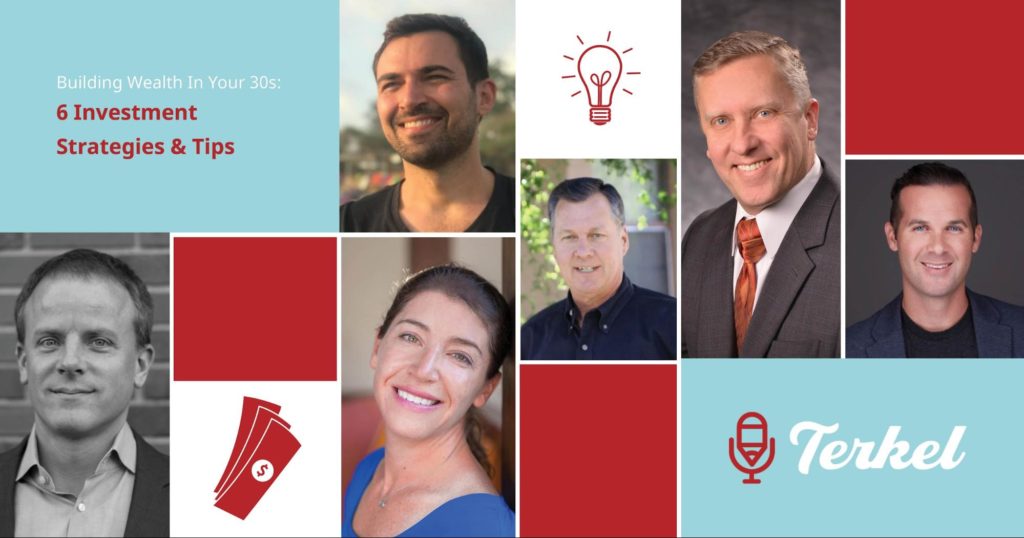It pays to invest early and often.
Starting to invest earlier in life ensures that your money will compound and grow over time.
By the time you reach your thirties, investing tends to become a serious consideration. People in their thirties may have families, their first mortgage, and a blossoming career that enables investing to take place.
So what’s the best investment strategy for someone in their 30s looking to build wealth?
We asked financial planners, thirty-somethings, and other professionals for their best investment strategies and tips.
Here’s what they had to offer about building wealth in your thirties:
Invest in your own companies
I’m a 36-year-old business owner and dad of 3. As I drive my minivan around town, I often think about the best way to build wealth in my mid-thirties. I’ve looked to max out retirement plan contributions for the last decade and set defined contributions to investing in mutual funds and stocks. But, I don’t believe any of that stuff is the best way to build wealth. The place I’ve landed is to invest in yourself, your ideas, and your own companies for the biggest investment. That way, you create real assets where you have a direct impact on the outcome. If you lose the investment, you just lose money. But you still win because you’ve invested in yourself, and the long-term payoff on “you” is one of the most rewarding returns in life. — Brett Farmiloe, Markitors
Start early on Real Estate
Real Estate continues to be an excellent way to build wealth. Especially in a state like Arizona, where we currently have a housing shortage and a large influx of people wanting to live here, owning real estate should be a key part of building wealth long term. — Rod Cullum, Cullum Homes
Invest in things you understand
Keep it simple by spending less than you earn; with the money that you retain, you can start building a safety fund of 3-6 months of spending. By doing so, you won’t need to sell investments or go into credit card debt if an emergency comes up. In regards to investments, ensure you are choosing investments with low fees and that you have a clear grasp on what you are investing in. Fully understanding what your investment entails will prevent you from getting emotionally attached to your investments. — Keith Piscitello, S2 Wealth Planning
Pay off your Debt
The best way to build wealth for a 35-year old is to start by paying off all of your debt as soon as you can. Pay off your credit cards, student loans, car loans, and maybe your home loan.
For your home loan, at least make sure you are making one extra payment per year to knock off seven years from your 30-year loan. Once you have your debt paid off I would highly suggest you start investing in yourself by starting your own business, where you can reap the benefits of its success, or by getting an advanced degree so you can move up within your current career. This will allow you to make more money faster, so then you can start diversifying your portfolio. — Ben Walker, Transcription Outsourcing, LLC
Side Hustles
Begin looking for educational opportunities, whether it’s online courses or certification programs, to help you build your business tool kit. The more educated you become, and the more skills you possess, the more attractive you will be to potential employers or for advancement with your current employer. Additionally, any new skills may also help you with a “side hustle,” which may one day become your main source of wealth. — Carrie McKeegan, Greenback Expat Tax Services
Investment Returns > Income > Expenses
At a foundational level, you need to make your income greater than your expenses, and then make your investment returns greater than your income. This has a couple of major implications. First, if you can make your expenses lower then it will be much easier to exceed them both in income and eventually investment returns. Second, the type of investment should have a probable return that will create the results you want on the desired timeline. Whether the yield is 2% or 8% is less important than if you can achieve those returns exceeding your expenses. For example, 2% on $250,000 might be okay if you live somewhere with a very low cost of living. –– Michael Alexis, Teambuilding
Terkel creates community-driven content featuring expert insights. Sign up at terkel.io to answer questions and get published.



Honest question for those of you reading. I’m a single parent with minimal savings of my own. I put money away in a RESP for my children,to give them a headstart. After years of low wage jobs I’m at a cross roads. How do I begin to build wealth at my age (mid-forties). I have ambitious goals,buy a house, and give back to the community. I can invest about $250 a month comfortably. Aside from a TFSA I have no other assets. I also plan on looking at ways to increase my income. So many sites geared towards Americas,nice to find a Canadian site